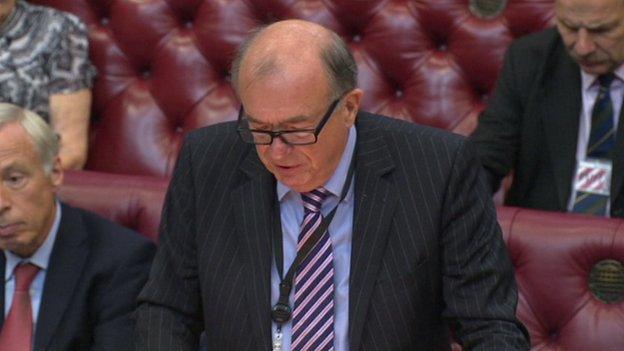Lord Sewel resigns from House of Lords after drug claims
- Published
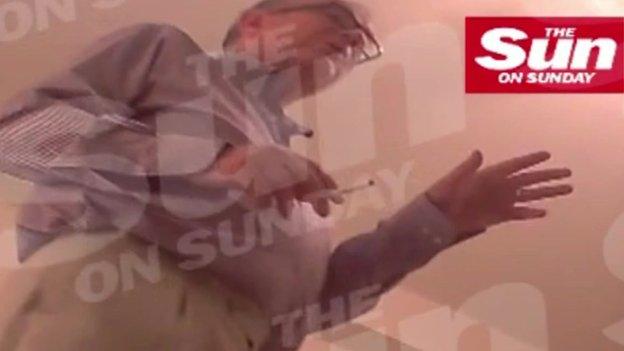
Lord Sewel was filmed making a series of disparaging remarks
Lord Sewel has resigned from the House of Lords after being filmed allegedly taking drugs with prostitutes.
Footage obtained by The Sun on Sunday appeared to show the peer - who had been deputy speaker of the Lords - snorting powder from a woman's breasts.
The peer has apologised for the "pain and embarrassment" caused and said his exit would "limit and help repair" the damage to the reputation of the Lords.
David Cameron is resisting calls from other parties for wider reforms.
Speaking in Singapore, where he is on a trade trip, the prime minister welcomed Lord Sewel's decision to "absent himself" but said he had tried and failed in the last Parliament to overhaul the Upper House and was not planning "to go down that route again".
The Metropolitan Police has said it is looking into "allegations of drug-related offences involving a member of the House of Lords", after searching a property in central London.
'Public confidence'
On Monday, the former Labour peer requested a leave of absence from the Lords, but sources had suggested he did not plan to quit.
But in letter to the Clerk of Parliaments published on Tuesday, he wrote: "The question of whether my behaviour breached the Code of Conduct is important, but essentially technical.
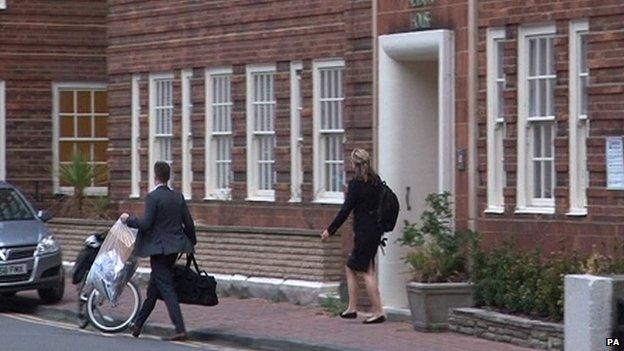
Police have searched a property in central London
"The bigger questions are whether my behaviour is compatible with membership of the House of Lords and whether my continued membership would damage and undermine public confidence in the House of Lords.
"I believe the answer to both these questions means that I can best serve the House by leaving it."
On Monday, Lord Sewel was also pictured wearing an orange bra and leather jacket as he reclined, smoking a cigarette.
Footage showed him making disparaging remarks about a number of senior politicians, including the prime minister, and other peers.

Who is Lord Sewel?
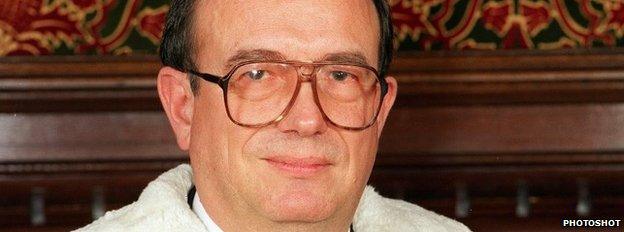
A former academic and councillor, Lord Sewel became a peer in 1996
Name: John Buttifant Sewel
Age: 69
Title: Lord Sewel, of Gilcomstoun in Aberdeen
Educated at Durham and Aberdeen universities
Worked as a lecturer at Aberdeen University
Joined the House of Lords in 1996
Lords career: Parliamentary under Secretary of State, Scottish Office, 1997-1999, opposition Scotland spokesman 2010, elected chairman of committees in 2012
UK representative to Nato Parliamentary Assembly, 1999-2002

Although Lord Sewel has resigned from the House of Lords he keeps the peerage he was given by the then Labour leader Tony Blair in 1996.
Baroness Stowell, the Conservative leader of the House of Lords, welcomed Lord Sewel's decision but said it was "disappointing" he had not made it earlier.
"For the House of Lords to earn the confidence of the public, all of us must respect the privileges that come with a peerage and recognise that - because we are unelected - it is especially important to meet the standards the public have a right to expect, and to act swiftly when we fail."
While the code of conduct governing peers' behaviour would be "continually kept under review", she said it was important that the Lords now had "powerful sanctions to deploy" against wrongdoers, including the threat of expulsion.
She added that it was evident from the Sun's footage that Lord Sewel had shown "contempt for Parliament and for the privileges associated with being a member of the House". She said it was "that contempt that was the most damming thing that led to us wanting to be quite rigorous in applying all pressures to him".
'Size of the Lords'
Critics of the Lords argue that, with 783 members, it has become too large and that many of its members play little or no part in its proceedings.
While a few people had "tarred its reputation", former Lords leader Lord Hill insisted the institution was still doing its job of revising legislation and holding the government to account effectively, while pointing out that new rules allowed peers to retire "without much fuss".
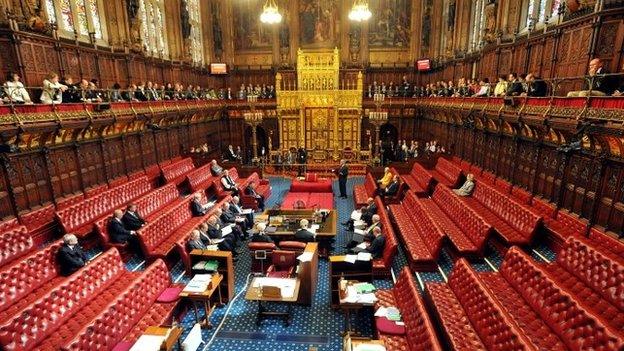
Nearly 800 peers are entitled to attend the Lords but many fewer actually do
"The key number to look at is the number of people who actually attend rather than those who are entitled to attend because there are an awful lot of peers who do not go along," he said.
"There are people going out as well as coming in. I think you have to keep an eye on the size but the key question is does the House of Lords do the job that people need it to do?"
Mr Cameron, whose government does not have a majority in the Lords and has suffered a number of defeats already, said peers should be "encouraged" to retire when no longer able to contribute.
Asked whether he would reconsider plans to reportedly create up to 40 new peers in the coming weeks, the prime minister said the Lords should "more accurately reflect" the composition of the Commons, the majority of whose 650 members are Conservative.
Labour and the Lib Dems have called for cross-party talks on the future of the House of Lords while the SNP said the episode illustrated the need for it to be abolished and replaced by a fully elected chamber.
"The House of Lords has never been held in such contempt by the Scottish people who see it as nothing other than a repository for the cronies and donors of the UK parties," said its shadow Commons leader Pete Wishart.
Who's in the House of Lords?
783 peers
currently eligible to vote in the House of Lords
-
670 Life peers
-
87 Hereditary peers
-
26 Bishops
-
£300 daily expenses available to each peer for attending at Westminster
Lord Sewel quit his £84,500 a year role as deputy speaker of the Lords, which he held for three years, and chairman of the Lords privileges and conduct committee in the wake of the revelations.
As one of the few salaried members of the House of Lords, Lord Sewel would have been entitled to take advantage of Parliament's Contributory Pension Fund although it is not clear whether he chose to pay into it and, if he did, whether he intends to now claim it.
- Published28 July 2015
